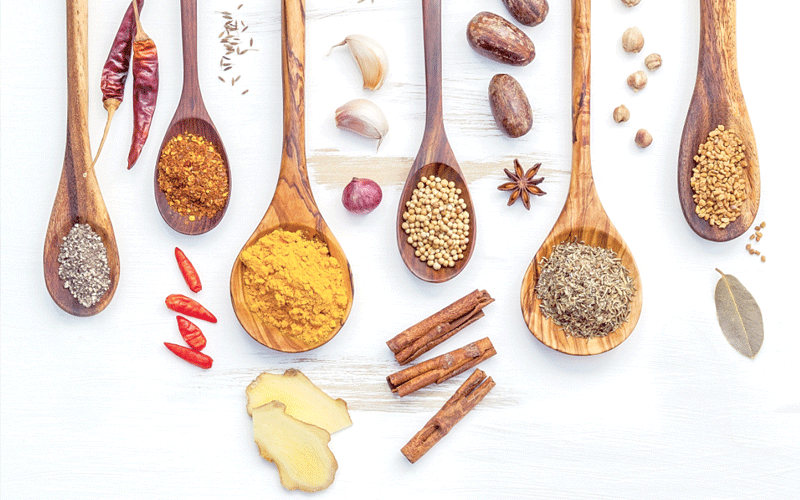Ten ways to spice up your health

Many herbs and spices were celebrated for their medicinal properties well before culinary use. However, modern science has now shown that many of them do indeed carry remarkable health benefits as Milliam Murigi outlines.
1. Garlic boosts immunity and improves heart health
Organic sulfur compound allicin in garlic gives it its pungent smell and makes it a healthy addition to your diet.
Garlic supplementation is well known for combatting sickness, including the common cold.
In test tubes, garlic appears to kill cancer cells, and studies involving people show some of the same outcomes.
According to the Iowa Women’s Health Study, involving 41,000 middle-aged women, those who routinely ate garlic, fruits and vegetables had a 35 per cent lower colon cancer risk.
Benefits came from raw and cooked garlic – not supplements. There is also convincing evidence for beneficial effects on heart health and for those with high cholesterol, garlic supplementation appears to reduce total and/or low-density lipoprotein cholesterol by about 10 to 15 per cent.
Human studies have also found garlic supplementation to cause significant reductions in blood pressure in people with high blood pressure.
In one study, it was just as effective as a blood pressure lowering drug.
2. Cinnamon manages blood sugars
It contains a compound called cinnamaldehyde, which is responsible for cinnamon’s medicinal properties.
Cinnamon has potent antioxidant activity, helps fight inflammation and has been shown to lower cholesterol and triglycerides in the blood.
But where cinnamon really shines is in its effects on blood sugar levels. Cinnamon can lower blood sugar by several mechanisms, including by slowing the breakdown of carbohydrates in the digestive tract and improving insulin sensitivity.
Studies have shown that cinnamon can lower fasting blood sugars by 10-29 per cent in diabetic patients
3. Peppermint relieves irritable bowel syndrome pain
Peppermint has a long history of use in folk medicine and aromatherapy. As is the case with many herbs, it is the oily component that contains the agents responsible for the health effects.
Studies have shown that peppermint oil can improve pain management in irritable bowel syndrome.
It appears to work by relaxing the smooth muscles in the colon, which relieves pain experienced during bowel movements.
It also helps to reduce abdominal pain. There are also some studies showing that peppermint in aromatherapy can help fight nausea.
4. Turmeric has anti-inflammatory effects
Turmeric is the spice that gives curry its yellow colour. It contains several compounds with medicinal properties, the most important of which is curcumin.
Curcumin is a remarkably powerful antioxidant, which helps to fight oxidative damage and boosting the body’s own antioxidant enzymes.
This is important, because oxidative damage is believed to be one of the key mechanisms behind ageing.
Curcumin is also strongly anti-inflammatory, to the point where it matches the effectiveness of some anti-inflammatory drugs.
5. Cayenne pepper for weight loss
Cayenne pepper is a type of chili pepper used to prepare spicy dishes. The active ingredient in it is called capsaicin, which has been shown to reduce appetite and increase fat burning in many studies.
For this reason, it is a common ingredient in many commercial weight loss supplements.
One study found that adding one gramme of red pepper to meals reduced appetite and increased fat burning in people who did not regularly eat peppers. It has also shown anti-cancer potential in animal studies, but not human.
6. Ginger used to treat nausea
It is loaded with nutrients and bioactive compounds that have powerful benefits for your body and brain. Studies have consistently shown that one gramme or more of ginger can successfully treat nausea.
This includes nausea caused by morning sickness, chemotherapy and sea sickness. Ginger also appears to have strong anti-inflammatory properties, and can help with pain management.
Ginger has been shown to speed up emptying of the stomach in people with chronic indigestion
7. Fenugreek to boost milk production
Fenugreek is commonly used in Ayurveda, particularly to enhance libido and masculinity. However, it contains the plant protein 4-hydroxyisoleucine, which can also improve the function of the hormone insulin.
Many human studies have shown that at least one gramme of fenugreek extract per day can lower blood sugar levels, particularly in diabetics.
It has also been shown to boost milk production in lactating women
8. Rosemary suppresses alergies
The active ingredient in rosemary is called rosmarinic acid. This substance has been shown to suppress allergic responses and nasal congestion.
In a study with 29 individuals, both 50 and 200 milligrammes doses of Rosmarinic acid were shown to suppress allergy symptoms.
The number of immune cells in nasal mucus also decreased, with reduced congestion.
9. Sage improves memory
Sage gets its name from the Latin word Salvere, which means “to save.” It had a strong reputation for its healing properties during the middle ages.
Current research indicates that sage may be able to improve brain function and memory, especially in people with Alzheimer’s disease.
Other studies have also shown that sage can improve memory function in healthy people, both young and old.
10. Cardamom for oral health
It is a spice with an intense, slightly sweet flavour that some people compare to mint. The use of cardamom to treat bad breath and improve oral health is an ancient remedy.
However, it is also known to soothe an upset stomach, and lab studies show it may also help fight inflammation.
Compounds in cardamom may help increase airflow to your lungs and improve breathing.
When used in aromatherapy, cardamom can provide an invigorating odour that enhances your body’s ability to use oxygen during exercise.








